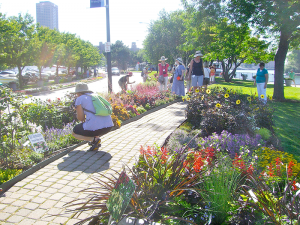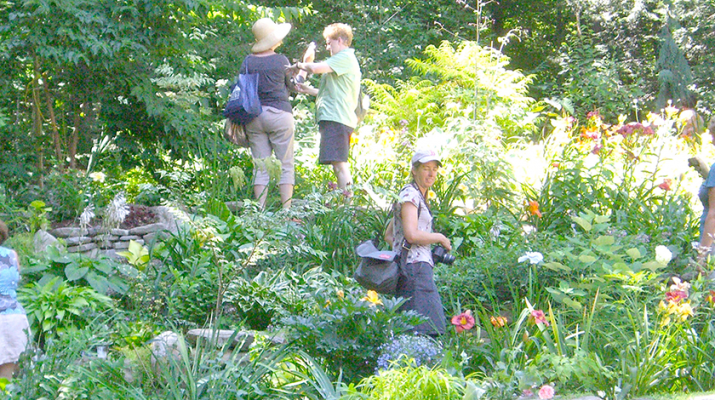Experts: Working the soil can relax, reduce stress levels and mental fatigue
By Nancy Cardillo

American botanist Luther Burbank may have said it best: “Flowers always make people better, happier and more helpful; they are sunshine, food and medicine for the soul.”
Over the past decade, gardening has grown tremendously in popularity throughout the United States; in fact, it’s one of the top five favorite leisure activities, and rightly so, for many reasons. There’s just something very satisfying about putting your hands in warm, rich soil, planting something (whether it be flower or vegetable), nurturing it and watching it grow into something beautiful.
But did you know gardening actually has proven health benefits?
There are the obvious health benefits gained from eating more organic fruits and vegetables and fewer processed foods, and the advantages of getting the necessary vitamins and minerals through diet rather than supplements. But gardening also provides physical and mental benefits, particularly as we age.
“As we get older, we have a harder time finding a purpose,” says geriatrician Kenneth Garbarino of the Geriatric Center of WNY at DeGraff Memorial Hospital. “A hobby such as gardening gives us something to live for year-round. In the summer, it needs our attention. In the winter, it’s something to look forward to, as we talk about it and plan for it. Gardening is a great way to maintain our health longer.”
Gardening can reduce stress and anxiety, and this is where that “hands in the dirt” idea comes in to play. After a busy day of work, errands, etc., spending even just 30 minutes working the soil relaxes you, reduces stress levels and mental fatigue. All that fresh air and hard work can stimulate the appetite and help you fall asleep easier and sleep more restfully.
Your risk of exposure to “lifestyle” diseases, such as diabetes, heart disease, high blood pressure and obesity are reduced when you garden. “Staying active, keeping stress levels down and eating healthier all work toward keeping these common lifestyle diseases at bay,” says Garbarino. “There’s also the benefits of getting out in the sun and absorbing that much-needed Vitamin D.”
Gardening also improves critical physical functions, such as strength, endurance and dexterity, and mental functions such as learning, problem solving and sensory awareness. It even helps to ward off dementia, as people who exercise body and mind tend to have a lower incidence of memory impairment.
As we age, bending forward, lifting heavy objects and using fine motor skills may be more difficult, but gardening is still very doable. Rather than planting a huge vegetable or flower garden, try container gardening, raised bed gardening, hanging baskets or terrariums. There are also many innovative tools that will help keep us gardening longer. Ergonomic tools, such as radius garden tools designed to keep your wrist at a natural angle; “bionic” gloves with anatomically positioned padding for comfort and improved grip; long-handled tools that allow you to dig, edge, till and plant without bending over, and garden wagons that let you sit in comfort and “scoot” along without having to constantly get up and down are just a few.
In Western New York, garden clubs abound, and offer opportunities to make new friends, learn and share your passion for gardening.
The Amherst Garden Club, for example, maintains several public gardens throughout Amherst, and also offers classes, field trips and flower shows.
“Part of our mission is to aid in promoting the beautification of our town,” says club president Sandra Smith. “We’re always looking for new members who have an interest in gardening, and we offer something for everyone, no matter the level of gardening expertise, the amount of available time, etc.”
If your living arrangement doesn’t provide space for you to garden, consider helping others by volunteering. Area organizations such as Grassroots Gardens WNY (www.grassrootsgardens.org), the Massachusetts Avenue Project (www.mass-ave.org) or Garden Walk Buffalo (www.gardenwalkbuffalo.com), to name a few, welcome volunteers.
The Buffalo & Erie County Botanical Gardens (www.buffalogardens.com) utilizes a variety of horticulture volunteers in its on-site greenhouses, Peace Garden and front gardens, depending on what’s needed and your capabilities.
All volunteers are fully trained and work closely with Gardens staff members.
“We have approximately 200 horticulture volunteers at the moment,” says Karen Hammer, program and volunteer coordinator at Buffalo & Erie County Botanical Gardens. “They handle a variety of tasks, from general cleanup, potting, propagation, planting, trimming and deadheading to pest management. We do our best to cater the task to a volunteer’s interests and physical capabilities.”

